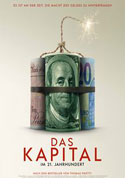

Opening 17 Oct 2019
Directed by:
Justin Pemberton
Writing credits:
Thomas Piketty, Matthew Metcalfe, Justin Pemberton, Thomas Piketty
Based on French economist Thomas Piketty’s powerfully astute 2013 bestselling nonfiction tome, Capital in the Twenty-First Century, the same titled documentary is riveting, and a must-see, at least once. New Zealand director Justin Pemberton co-wrote with Matthew Metcalfe an exceptional screenplay encapsulating the book’s salient points: how if wealth and income inequality are not equalized (greater taxation on the rich) the impact for European and American societies will be social and economic instability. Editor Sandie Bompar beautifully splices in interviews, and stunning archival footage, although unconvinced cinematic clips added anything; completing behind-the-scenes talent are cinematographers Jacob Bryant and Darryl Ward, with Jean-Benoît Dunckel’s music.
Reaching back to the 18th century when poverty was a death sentence for the masses—life expectancy was 17 years, Capital in the Twenty-First Century is mind-boggling. In Europe, novelists Jane Austen, Henry James and Honoré de Balzac’s themes described the inflexible class structures from accumulated wealth, and inequalities between gentry and laypeople. Throughout the 19th and 20th centuries, from the French Revolution to the exodus of people to New Countries where, essentially, what they fled was recreated, is covered. Only during the 1930s until mid-1970s was an extraordinary redistribution of wealth by governments achieved, necessitated by two world wars, the Great Depression, and a worldwide recession. U.S. President Franklin D. Roosevelt administration’s New Deal (1933-1936) objectives were to redistribute wealth to promote relief and reforms, thereby improving conditions for all. As the social landscape changed, it moved toward a benefits system. During the last decades of the 20th century, industries moved abroad, new technologies emerged, and profits were again put before people.
Interspersed with pop-culture, political movements and figures and facts, and some innovative graphics, are talking heads that lead audiences through the maze of capitalism over the centuries. These include Nobel laureate Joseph Stiglitz, economist Francis Fukuyama, historian Kate Williams, author/economist Thomas Piketty and other relevant articulate individuals. The warnings are clear in this carefully and cleverly structured film.
In Europe and the United States, inherited wealth is again threatening social orders as the middle class rapidly dwindles, thus undermining democratic values and income inequality. That said, what good is having an understanding of that without action? Public debate and discourse, and showing up at the polling place and voting are good places to start. (Marinell Haegelin)